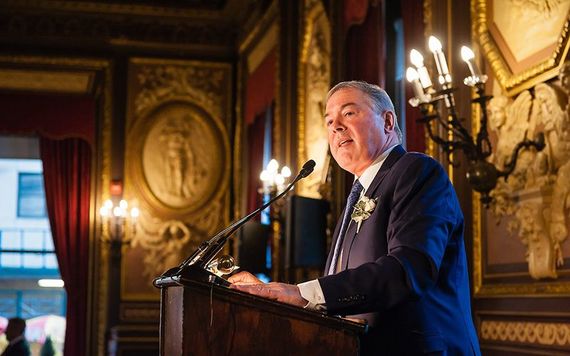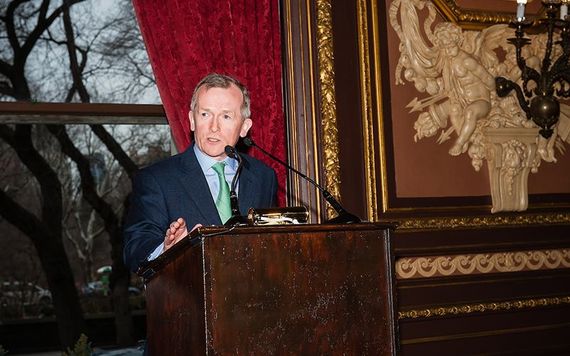Twenty years ago today on April 10, 1998, the Good Friday/Belfast Agreement was signed. To mark the 20th anniversary, we look back on the 20 Years of Peace conference that reflected on the past two decades of peace in Northern Ireland.
On Thursday, February 22, in New York, IrishCentral in partnership with Co-Operation Ireland, brought together representatives and experts from the Republic of Ireland, Northern Ireland, and the UK for the "20 Years of Peace" conference.
Read more: Celebrating 20 years of peace and the signing of the Agreement with Seamus Heaney
The event was organized to reflect on the importance of the Agreement; analyze the current challenges in Northern Ireland, especially in relation to Brexit uncertainty; and project positive plans for future cooperation, peace and prosperity for the Republic of Ireland and Northern Ireland.
Featuring speakers such as Ireland's Tánaiste and Minister for Affairs Simon Coveney; Ciaran Madden, Irish Consul General; Antony Phillipson, British Consul General; and Jim Clerkin, Co-operation Ireland USA and President and CEO of Moet Hennessy North America, as well as representatives from Northern Ireland’s main political party, the last 20 years in Northern Ireland were discussed over three panels focusing on community leaders and their views on the peace process, the important role of the diaspora, and the lessons that must be learned from the last two decades to bring us even further forward.
Read more: Insights from 20 Years of Peace conference on Northern Ireland
“Because the Executive is not in place, there can be some cynicism about celebrating the Agreement so I think it is important to point out that there probably 1,500 people alive and 10s of thousands uninjured because of the agreement,” said Peter Sheridan of Co-operation Ireland, the all-island peace-building charity.
“We are not walking behind coffins of other Irishmen on a daily basis as we were prior to the agreement nor, are we watching towns and villages being routinely devastated with bombs.
“The border is invisible and celebrating The Agreement is also about celebrating that it recognised the birthright of all the people of Northern Ireland to identify themselves and be accepted as Irish or British, or both, as they may so choose, and accordingly confirm that their right to hold both British and Irish citizenship is accepted by both Governments and would not be affected by any future change in the status of Northern Ireland.”
Read more: This charity has been building peace in Northern Ireland for nearly 40 years

anel Discussion: Reflections on the Past to Foster Peace Going Forward. Image: Moya McAllister.
Sheridan’s sentiment on the Agreement’s 20th anniversary was an opinion widely reflected in February’s conference, both in the panel discussions, in the opening and closing speeches and in the keynote speech from Tánaise Coveney.
Starting off proceedings at 20 Years of Peace, Co-Operation Ireland Chairman Jim Clerkin spoke about how he eventually hopes to shut down the organization once complete and final peace is realized.
Read more: The dream that never died: the journey to peace in Northern Ireland

Co-Operation Ireland Chairman Jim Clerkin. Image: Moya McAllister.
"That's a strange statement until you realize what it means," said Clerkin, adding "today we could not shut down."
"I do believe that with your help and support we may not be too far away from shutting it down ... The dream we seek is a lasting peace and reconciliation on the island of Ireland. If you can dream it you can do it."
One of the successes of the Agreement can be seen in Tourism Ireland, the all-island organization set up after Good Friday 1998 to market the island of Ireland abroad as a tourist destination.
“One of the most significant policy decisions taken in the last number of years was 20 years ago under the Good Friday Agreement and the decision was made to integrate the overseas functions carried out previously by the Northern Ireland Tourism Board and the Irish Tourism Board,” said Niall Gibbons, Chief Executive of Tourism Ireland.
“That works under strand two of the Good Friday agreed and report to the north/south ministerial council.”
In the last 16 years since the official establishment of Tourism Ireland, the number of annual visits to Ireland has grown from seven million to 10.65 million, Gibbons added, again calling attention to the many positive changes and improvements that have taken place in the last 20 years outside of the political sphere.
“I think it’s sometimes good to put the pause button on for a moment and reflect on some of the positive things that have happened and certainly the tourism story has been a very, very positive story over the last while,” he continued.

Tourism Ireland CEO Niall Gibbons. Image: Moya McAllister.
Although each panel throughout the day brought incredible insight to the work of the last 20 years and the work that led up to the signing of the Agreement with wonderfully frank, informed and passionate discussion on what 20 years of peace really means, one of the highlights of the conference was the keynote from Tánaitse Simon Coveney.
Emphasizing that the lives lost during the Troubles, and those who were injured or bereaved will never be forgotten, the Tánaiste talked of the critical importance of achieving real reconciliation: “This is the moment for a renewal of the commitment in the Good Friday Agreement to reconciliation – deep and lasting reconciliation.”
“My pledge today is that my Government will continue to support the vital work that the people on the ground in communities across Northern Ireland are doing in progressing reconciliation – true, lasting, sustained reconciliation.”
20 Years of Peace Celebration Event - Keynote Speech Posted by IrishCentral.com on Thursday, 22 February 2018
He also referred to the current challenges and the need to recommit to the principles at the core of the Good Friday Agreement. The Tánaiste said: “It is easy to feel negative, easy to be cynical or despondent, easy to cast about for someone to blame. We will not go down that path.”
“Nor will we give credence to those who – even in recent days - glibly claim that the Good Friday Agreement has failed or outlived its utility. That is simply not true. And that kind of reckless talk, ignorant of the history and evolution of peace in Northern Ireland, cannot go unchallenged.”
You can see a full recap of the 20 Years of Peace Conference with Co-operation Ireland here.




Comments